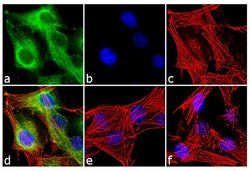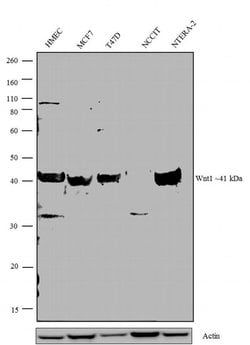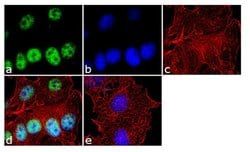Huntingtin Polyclonal Antibody, Invitrogen™
Manufacturer: Thermo Scientific
Select a Size
| Pack Size | SKU | Availability | Price |
|---|---|---|---|
| Each of 1 | 72-002-9-Each-of-1 | In Stock | ₹ 45,523.50 |
72-002-9 - Each of 1
In Stock
Quantity
1
Base Price: ₹ 45,523.50
GST (18%): ₹ 8,194.23
Total Price: ₹ 53,717.73
Antigen
Huntingtin
Classification
Polyclonal
Conjugate
Unconjugated
Gene
Htt
Gene Alias
AI256365; C430023I11Rik; Hd; HD protein; HD protein homolog; Hdh; HTT; Huntingtin; huntingtin (Huntington disease); Huntingtin, myristoylated N-terminal fragment; Huntington disease gene homolog; huntington disease protein; huntington disease protein homolog; IT15; solute carrier family 6 (neurotransmitter transporter, serotonin), member 4
Host Species
Rabbit
Purification Method
Affinity chromatography
Regulatory Status
RUO
Gene ID (Entrez)
3064
Content And Storage
Store at 4°C short term. For long term storage, store at -20°C, avoiding freeze/thaw cycles.
Form
Liquid
Applications
Immunocytochemistry
Concentration
0.5 mg/mL
Formulation
PBS with 0.1% BSA, 30% glycerol and 0.09% sodium azide; pH 7.2
Gene Accession No.
P42858
Gene Symbols
Htt
Immunogen
Peptides corresponding to Human HTT (aa 82-99, 584-601, 650-666)
Quantity
100 μg
Primary or Secondary
Primary
Target Species
Human
Product Type
Antibody
Isotype
IgG
Description
- These Polyclonal antibodies are of rabbit origin developed by immunizing animals with proteins or peptides
- The polyclonal antibody is purified by affinity purification from the rabbit sera generated after immunizing the rabbits with a specific type of protein or peptide
- The purified antibody is tested for its functionality in various relevant research applications
- The antibody is developed for Research Use Only and is non-hazardous or non-infectious in nature
- This antibody is predicted to react with Monkey, Pig and Cat
- Huntingtin is a disease gene linked to Huntington's disease (HD), a neurodegenerative disorder characterized by loss of striatal neurons
- This is thought to be caused by an expanded, unstable trinucleotide repeat in the huntingtin gene, which translates as a polyglutamine repeat in the protein product
- HD is a mid-life onset autosomal dominant neurodegenerative disease that is characterized by psychiatric disorders, dementia, and involuntary movements (chorea), leading to death in 10-20 years.The huntingtin locus is large, spanning 180 kb and consisting of 67 exons
- The huntingtin gene is widely expressed and is required for normal development
- It is expressed as 2 alternatively polyadenylated forms displaying different relative abundance in various fetal and adult tissues
- The larger transcript is approximately 13.7 kb and is expressed predominantly in adult and fetal brain whereas the smaller transcript of approximately 10.3 kb is more widely expressed
- The genetic defect leading to Huntington's disease may not necessarily eliminate transcription, but may confer a new property on the mRNA or alter the function of the protein.



